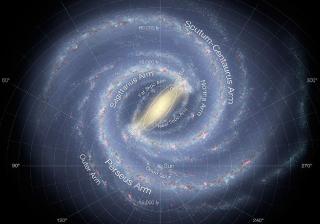Bibcode
López-Corredoira, M.; Sylos Labini, F.
Bibliographical reference
Astronomy and Astrophysics, Volume 621, id.A48, 14 pp.
Advertised on:
1
2019
Journal
Citations
39
Refereed citations
38
Description
Context. The Gaia Collaboration has used Gaia-DR2 sources with
six-dimensional (6D) phase space information to derive kinematical maps
within 5 kpc of the Sun, which is a reachable range for stars with
relative error in distance lower than 20%. Aims: Here we aim to
extend the range of distances by a factor of two to three, thus adding
the range of Galactocentric distances between 13 kpc and 20 kpc to the
previous maps, with their corresponding error and root mean square
values. Methods: We make use of the whole sample of stars of
Gaia-DR2 including radial velocity measurements, which consists in more
than seven million sources, and we apply a statistical deconvolution of
the parallax errors based on the Lucy's inversion method of the Fredholm
integral equations of the first kind, without assuming any prior.
Results: The new extended maps provide lots of new and corroborated
information about the disk kinematics: significant departures of
circularity in the mean orbits with radial Galactocentric velocities
between -20 and +20 km s-1 and vertical velocities between
-10 and +10 km s-1; variations of the azimuthal velocity with
position; asymmetries between the northern and the southern Galactic
hemispheres, especially towards the anticenter that includes a larger
azimuthal velocity in the south; and others. Conclusions: These
extended kinematical maps can be used to investigate the different
dynamical models of our Galaxy, and we will present our own analyses in
the forthcoming second part of this paper. At present, it is evident
that the Milky Way is far from a simple stationary configuration in
rotational equilibrium, but is characterized by streaming motions in all
velocity components with conspicuous velocity gradients.
Data of Figs. 8-12 and 16 are available at the CDS via anonymous ftp to
http://cdsarc.u-strasbg.fr (http://130.79.128.5) or via http://cdsarc.u-strasbg.fr/viz-bin/qcat?J/A+A/621/A48
and at http://www.iac.es/galeria/martinlc/codes/GaiaDR2extkin/
Related projects

Morphology and dynamics of the Milky Way
This project consists of two parts, each differentiated but both complementary: morphology and dynamics. Detailed study of the morphology of the Milky Way pretends to provide a data base for the stellar distribution in the most remote and heavily obscured regions of our Galaxy, through the development of semiempirical models based on the
Martín
López Corredoira